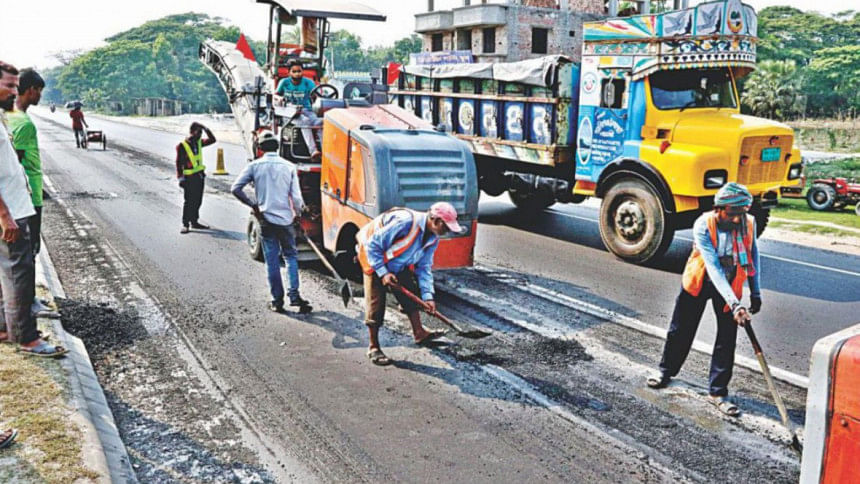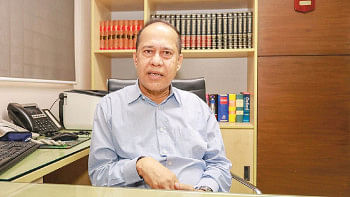Improving the process of our urban development

In building urban infrastructure and services, we are faced with a huge challenge of meeting the demand created by increasing rate of urbanisation in Bangladesh. It is a paradoxical situation where central and local government bodies are constantly implementing new infrastructure projects but cannot keep up with the demand due to: i) Need for new roads, drains, water supply, health and educational institutions, public toilets etc. in the ever-growing urban context; and ii) Repeated demand created mainly due to poor operation and maintenance (O&M) of infrastructure facilities. O&M is considered by engineers as an essential and routine task to enhance the life of infrastructure and assets. However, there is lack of appreciation about the value of O&M in sustaining development efforts.
Operation and maintenance refer to operating a service with good quality and preserving infrastructure in usable conditions through inspection, routine maintenance and scheduled replacement procedures. The purpose of O&M is to ensure efficiency and sustainability of service delivery and infrastructure quality. O&M activities are important for at least three different reasons: (i) It ensures the sustainability of an infrastructure and enables service delivery; (ii) It helps to provide agreed amount of services and benefits to the end-users; and iii) it prevents a service system from collapse, creating environmental and health hazards.
We often see roads, drains and public buildings falling into disrepair and become unusable before their projected lives are reached. Not properly maintaining urban services is considered a loss for the country. The responsibility of O&M falls mainly on the government departments which invest in infrastructure and provide public services. Local government bodies like City Corporations and Paurashavas in urban areas and Union Parishads, Upazila Parishads and Zilla Parishads in rural areas also develop roads, bridges and drainage systems; build offices, houses, community centres, markets, parks and playgrounds; and provide utility services like drinking water, streetlights, solid waste collection and others. The responsibility to operate and maintain them also falls mostly on the respective local bodies.
Those of us living in urban areas regularly experience problems with our piped water in terms of both quantity and quality of supply, to give an example of challenges faced by urban people. This problem is, however, not caused only by technical factors but also due to managerial, financial, institutional and social reasons. These have a relationship with the level of O&M planned and implemented to keep service delivery at a sustainable level. An ongoing and quality O&M is crucial for sustainability and lack of it can cause service failures and frustration for the urban dwellers. Poor O&M planning, limited budgetary allocation, inadequate cost recovery, shortage of staff and centralised agency's inadequate outreach capacity are responsible for early decay of public infrastructure and poor utility services.
Operation and maintenance have been a neglected area in Bangladesh so far, but they have been getting some attention in recent times. The government is now emphasising the need for routine maintenance especially after completion of a development project. It has been recognised that not properly maintaining the physical conditions both during and after a project ended is supposed to lower its value and has a serious negative consequence on the social benefits accruing from it. Not maintaining a project well is also reasoned as an evidence of poor results derived from it and this often obstructs the policymakers from pursuing same type of projects in future, although the project, if properly maintained, may have the potential for immense public benefit. A crumbling school building, for example, cannot be a justification for not building more schools. Instead, maintaining it well would save it from falling apart in the first place and save public money from being misused later on.
O&M has gained some importance over the past few years and some project managers are consciously adopting improved O&M practices. One such example is the adoption of improved O&M planning and implementation modalities under a World Bank funded "Municipal Governance and Services Project (MGSP)" being implemented since 2015 in 89 City Corporations and Paurashavas through an agreement between the WB and Local Government Division of the Ministry of Local Government, Rural Development & Cooperatives. This project is supporting building of basic urban services that include road construction and rehabilitation, bridges and culverts, drainage, public toilets, streetlights, wholesale/kitchen market, community centres and bus/truck terminals. The urban local bodies are each preparing a 5-year Capital Investment Plan and an annual O&M Plan. They are drawing up these plans in a participatory manner with the active support of the local communities. This has greatly helped maintain the urban infrastructure in good conditions.
Different development departments and service agencies need to increasingly plan for the operation and maintenance of their projects and programmes whether they are funded with revenue or development budgets. They should draw up annual O&M plans, allocate budgets, train their staff, undertake routine maintenance and monitor their performances. In some cases, the task of O&M may be contracted out to the private sector or to the NGOs if that is proved to be more effective and cost-efficient. Routine check-up and maintenance using a regular schedule will reduce the need for costly repairs and save public money. Bangladesh is implementing over 1,200 projects at this point of time, some of which require massive budgetary investments. We should not let the physical value of project infrastructure to go down. In case of projects using revenue budget, a part of the budget should be earmarked for O&M to sustain the results derived from them. In case of development projects, regular operation and maintenance cost should be arranged or a special allocation should be ensured if a project is not extended, to sustain the social benefits.
Dr Nawshad Ahmed is an economist and urban planner. He worked previously as a UN official in Bangladesh and abroad.

 For all latest news, follow The Daily Star's Google News channel.
For all latest news, follow The Daily Star's Google News channel. 



Comments